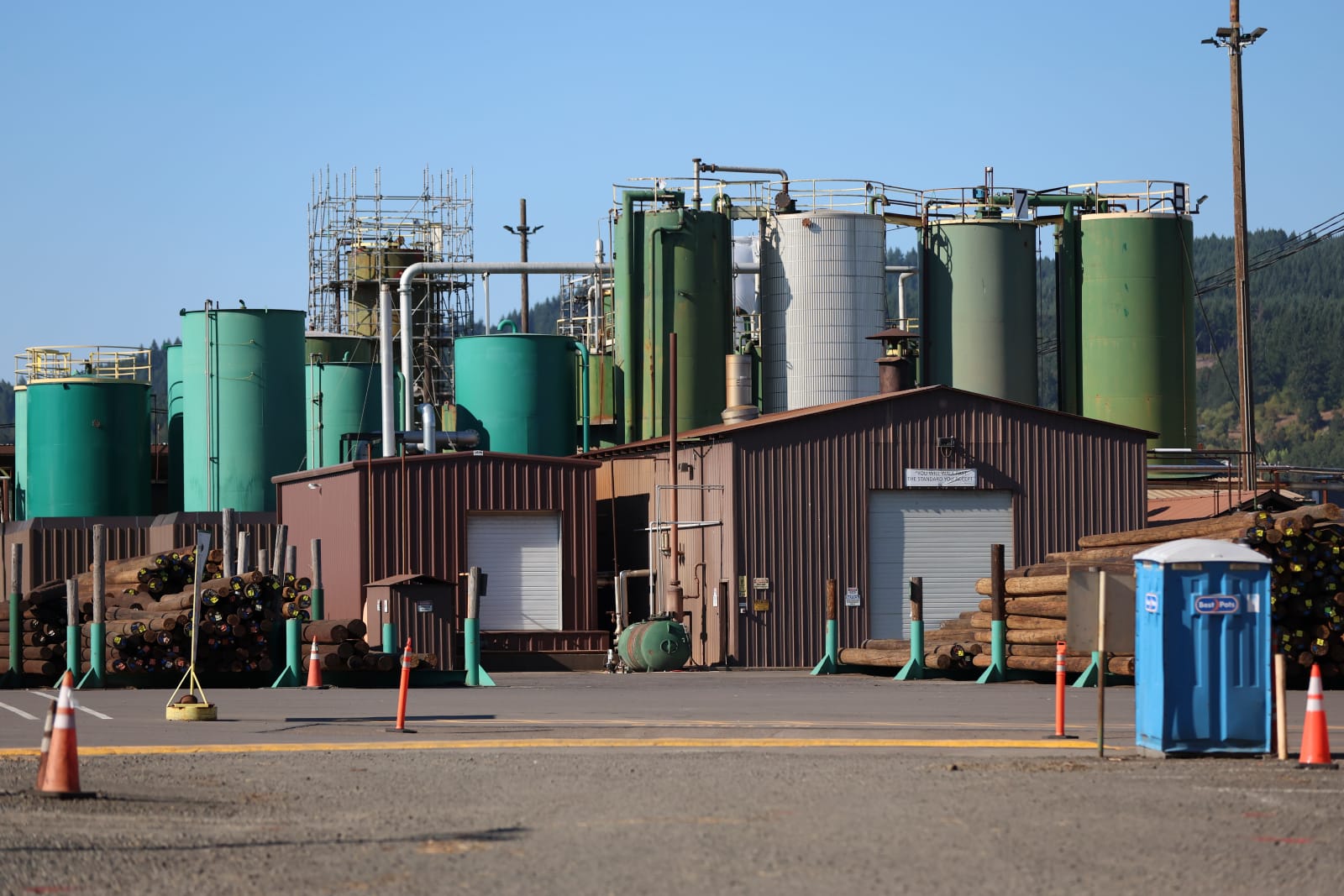Complaint against WA Rep. Tarra Simmons alleges misuse of $30,000 in campaign funds
It’s the third ethics complaint filed against her in recent months
The penalty comes days after InvestigateWest found regulators investigating the pollution didn’t take steps to immediately stop it

The Oregon Department of Environmental Quality has fined a polluting wood treater in northwest Oregon more than $1 million for a slew of violations stretching back to 2022.
The seven-figure penalty comes just 11 days after InvestigateWest revealed that state regulators had been taking years to stop Canadian company Stella-Jones from sending stormwater tainted with toxic wood preservatives into the South Yamhill River, a drinking water source for nearly 6,000 residents in the town of Sheridan. Regulators’ lack of enforcement and public disclosure kept the pollution hidden from residents, despite inquiries about potential human and environmental health effects from the site.
DEQ cited Stella-Jones for 23 violations including releasing polluted stormwater into the river, illegally disposing of hazardous wastes and failing to report and immediately clean up chemical spills. Most of the penalty — more than $877,000 — sanctions Stella-Jones over money the company saved by cutting corners on its environmental compliance. DEQ said Stella-Jones saved $577,000 alone by failing to clean out its stormwater treatment system, which could have prevented or mitigated some pollution.

The most expensive violations were for illegally sending thousands of tons of hazardous waste to landfills not permitted to accept it and for releasing polluted stormwater into the South Yamhill River, according to DEQ’s enforcement letter.
DEQ found the releases into the river “had a significant adverse impact on human health or the environment.”
State officials said they have no plans to take the most drastic step available against the company: shutting down Stella-Jones’ operations in Sheridan by revoking the permit that allows it to release water into the river. Instead, they are ordering the company to test the water more frequently and make upgrades to its stormwater treatment system.
“If we revoked the permit, DEQ would lose a tool to regulate the facility — and because it is a Superfund site, it would still be generating contamination and stormwater that needs treatment,” said Dylan Darling, an agency spokesperson.
Erin Saylor, interim manager of DEQ’s enforcement office, said in a news release Monday that the agency “hopes the magnitude of this enforcement will … result in long-term compliance at the facility.”
“This enforcement not only addresses the company's past violations, but also requires the company to revise its operations plan, conduct additional monitoring, and take other preventative measures,” Saylor said.
Stella-Jones did not immediately respond to questions about the penalty or whether it plans to appeal.
DEQ has been investigating Stella-Jones for repeated violations of its stormwater permit for more than three years while continuing to allow the company to dump stormwater tainted with pentachlorophenol, a likely carcinogenic preservative, into the South Yamhill River. During that time, the agency also helped police and prosecutors investigate the company, culminating in Stella-Jones pleading guilty to 10 counts of unlawful water pollution in court last month. To resolve that case the company agreed to pay a $250,000 fine.
DEQ took years to finish up its own review because the case was so complex and the enforcement office is understaffed, said Darling, the spokesperson.
The agency did little to inform residents about what was going on while it repeatedly warned Stella-Jones that it was facing imminent penalties, InvestigateWest's reporting showed.
A DEQ spokesperson said the agency has kept “all those who need to know” informed of the situation including city officials, residents who live next to the site and the Confederated Tribes of the Grand Ronde, whose reservation lies a few miles upstream of the site and whose ceded lands include the city of Sheridan.
However, some Sheridan residents who inquired about the health of the river received only vague responses from the agency. In the summer of 2023, Mike Hailey, a former resident, asked the agency why his crayfish traps were empty downriver from Stella-Jones, the first time he had encountered that in decades. He was told only that the Environmental Protection Agency was doing testing in the area and more information would be available after that.

The EPA has been involved with Sheridan’s wood treatment site for decades. In 2001, when the site was owned by a different company, the EPA designated it a Superfund, which aims to clean up chemicals that pose a risk to human health. It spent the next decade and millions of dollars cleaning up pentachlorophenol-contaminated soil and groundwater. While continuing to monitor the site, the EPA discovered that its own measures to contain tainted groundwater were likely failing in 2022, and began investigating the extent of the pollution onsite to determine if new cleanup was warranted. That cleanup is still likely years from being completed, but the EPA has determined that Stella-Jones is responsible for at least some of the contamination on the property, due to its repeated spills.
Both the EPA and DEQ had banned the use of pentachlorophenol on the property during the Superfund cleanup, but both reversed course in 2011, after the company onsite said the plant would close if it wasn’t allowed to start using pentachlorophenol again. DEQ continues to oversee the site by way of air and water quality permits and enforcement of rules around hazardous waste.
The EPA has since imposed a phased ban on pentachlorophenol and will completely bar its use by February 2027, after concluding there are other, less harmful alternatives wood treaters can use.
Aside from DEQ’s civil penalty issued Monday, state and federal regulators have previously leveled smaller penalties against Stella-Jones for releasing contaminated stormwater and chemical spills.
In July, the EPA reached a settlement agreement with Stella-Jones for $98,000 for its failure to maintain an adequate spill prevention plan and train workers under the federal Clean Water Act.
Stella-Jones could cover up to 80% of the $1 million penalty by funding an environmental project aimed at benefiting human health or the environment, subject to approval by DEQ. It previously took that option in 2018 to resolve an earlier DEQ penalty for pentachlorophenol pollution, reducing invasive blackberry and ivy along a creek in a nearby town.
It could face additional penalties if it fails to comply with any of DEQ’s orders aimed at stopping continued pollution on the site.
The story you just read is only possible because readers like you support our mission to uncover truths that matter. If you value this reporting, help us continue producing high-impact investigations that drive real-world change. Your donation today ensures we can keep asking tough questions and bringing critical issues to light. Join us — because fearless, independent journalism depends on you!
— Jacob H. Fries, executive director
DonateCancel anytime.
Subscribe to our weekly newsletters and never miss an investigation.